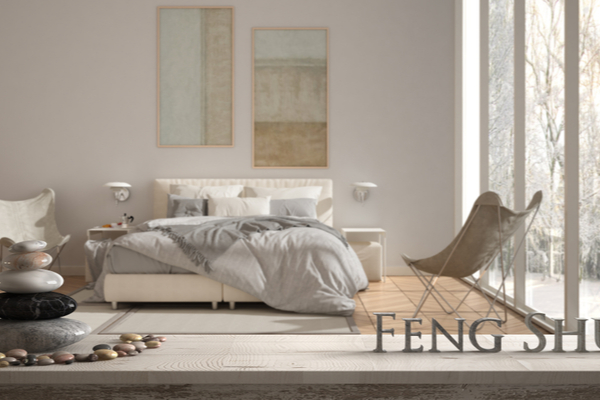A feng shui bedroom is a peaceful and balanced environment that promotes a better night’s rest. But contrary to popular belief, feng shui is not a Chinese interior design concept or related to any belief system. The words literally translate to “wind water.” According to P.K. Odle, master feng shui consultant and executive director of the renowned American Feng Shui Institute, “Just like gravity, feng shui influences exist in natural and man-made environments. Whether you believe it or not, they are already affecting your daily life.”
Feng shui isn’t something you do, it is something that’s everywhere. It affects you in ways you may not even realize. “All buildings have a unique feng shui energy blueprint from the moment they are built, which you can think of as the building’s DNA sequence,” Odle says.
Feng shui as an art and science
Classical feng shui is both an art as well as a sister science to acupuncture. “Both ancient Chinese sciences have been improving people’s lives for centuries and are based on the Yi Jing or Book of Changes, which acknowledges that everything is energy,” Odle says. “Qiis the Chinese word for the universal lifeforce energy that is in a constant state of change.”
According to Odle, the science part of feng shui is the time-tested calculation methods that reveal the unseen feng shui energy blueprint of a building, which is determined by both its magnetic orientation as well as when it was built. “These repeatable energy combinations have predictable consequences on the lives of the building’s occupants due to prolonged exposure to them. And as with all things in life, there is a mixture of supportive and harmful energy combinations within every building,” she says.
The art of feng shui relates more to decorating and furniture to create positive flow. After all, a room with unbalanced energy can affect our health, relationships, and finances more than we can probably imagine. Here are some feng shui bedroom rules to follow when decorating one of the most important rooms in your home.
Feng shui bedroom rules
Proper placement of furniture and accessories is at the heart of creating a feng shui bedroom. This is because every building has an unseen section grid, like a tic-tac-toe game. “The feng shui blueprint grid divides the interior width and depth by three,” Odle says. “These energy grid lines are like unseen beams that can cause health problems in the area of the body that is bisected between two sections of the energy grid.”
If there is one key to a proper feng shui bedroom layout, it’s to avoid bedrooms with exposed beams. But if your bedroom already has exposed beams, just make sure that occupied furniture is away from them. Keeping your bedroom clutter-free is also essential to good feng shui. A messy bedroom isn’t good for energy flow, even if all of your furniture is in the right place. So commit to keeping a neat and tidy space.
Correct bed placement is key to a feng shui bedroom
A good general rule is to make sure the top of your head is near a solid wall. “Or at least toward a wall with a closed window that doesn’t have any drafts. This position is to reduce the movement of Qi or energy above your head, so you will have a restful night’s sleep,” Odle explains.
Your headboard should fit up against your wall. But realistically, floor molding can create a small amount of separation, so try to keep your bed as close to the wall as possible. However, if for any reason your bed cannot fit up against a wall, Odle suggests being mindful of keeping the door closed, or at the very least, a few inches ajar, when you’re laying in bed.
The bed you choose is also important. A solid wood frame or a solidly upholstered headboard is best for feng shui. Headboards with multiple panels, open bars, or beds with built-in shelving or storage should be avoided.
Optimal feng shui bedroom colors
To choose the best feng shui colors for your bedroom, Odle recommends having the space professionally evaluated. However, avoiding primary colors—in particular reds, purples, blues, and black—is a good rule of thumb. “They can trigger major problems depending on the feng shui energies of the space,” she explains.
So if you’re redecorating, look for furniture, bedding, and accessories that are neutral in color. If you can only change one element of the room, switch up your bedding. Look for neutrals that are calming without being uninteresting.
Feng shui bedroom rules regarding mirrors
While most of us like to keep mirrors in the bedroom, a feng shui bedroom should not have one. Odle explains that because mirrors reflect light, it makes the energies of the bedroom very active, or yang. “This causes delays in going to sleep after lights out, because you are waiting for the bedroom’s energies to become more still, or yin.”
Another consequence of mirrors in the bedroom is that, depending on your date of birth and gender, they can activate what is called your personal “lonely pillow” direction. Odle says this can affect your relationships, preventing them from progressing and result in you sleeping alone.
Balance energy with elemental remedies
Another part of creating a feng shui bedroom is implementing the necessary elemental remedies as accessories to complement the space. The remedies are the five elements: water features, plants for wood, fire colors (reds and purples), and objects made of earth or metal. However, Odle says that it is never about having all five of the elements represented in each room. “The mathematical calculations reveal which element is required to optimize the existing unseen energy combination.”
—
Photo Credit: Archi_Viz / Shutterstock.com
